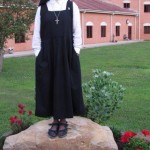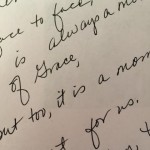March is Women’s History Month, and a good time to introduce you to the sorts of formidable women who made (or are making) enormous differences to the lives of many, but who frequently go unmentioned in the mainstream. Today I am going to introduce you to three of them. Interestingly enough, the first two hail from the affluent Philadelphia Society of the 19th century — one was heiress to a fortune — and the other is a modern woman of boundless energy, imagination and great warmth.
Because it is her feastday in the Catholic calendar, let’s start with the heiress who gave it all up to become a saint, instead. Pat Gohn gives us a terrific look at Katharine Drexel:
To say she came from money would have been an understatement. But what is more remarkable is how her parents raised her. Contrary to being possessed by their riches, the 19th-century Drexel family from Philadelphia maintained that wealth was simply loaned to them to be shared for the good of others.
Katharine Drexel, born in 1858, grew up one of three heiresses to a family fortune. Her grandfather, Francis, and his sons, founded and ran the Drexel Bank. Her successful uncle, Anthony Drexel, pioneered banking networks and the early days of Wall Street. He also opened Drexel University with the goal of helping people improve their station in life by offering low-cost tuition.
in 1885, while still a young woman, Drexel opened a school for Native Americans in Santa Fe, New Mexico; struck by their poverty, and also the marginalization of African Americans, she pleaded with the pope to send missionaries for their sakes, and was challenged to become a missionary, herself. This she did with her whole heart, as Gohn writes:
Katharine and a few companions founded the Sisters of the Blessed Sacrament for Indians and Colored People. The title of her community summed up the two driving forces in her life: devotion to the Blessed Sacrament and her love for the most deprived people in her country . . . opening over sixty schools during her tenure. Using a combination of great prayer and generosity—and no doubt, the gift of her family’s business acumen—she opened a network of schools around the country that some say were modeled after her uncle’s banking networks.
The most famous school Katharine founded was Xavier University in New Orleans. Opened in 1915, it was the first Catholic institution for African Americans in the United States.
Read the rest; it’s quite a story. One that would make a great film, actually.
Another great film — nay, mind-blowing — could be made from the life of our next Philadelphia girl, one Cornelia Augusta Peacock, who Dr. Pat McNamara tells us eventually became Cornelia Connelly and then, finally, she became her truest self. 
Married to an Episcopal priest, Pierce Connelly, she and her ambitious husband eventually became Catholic: Their conversion became front-page news. In Rome, Connelly orchestrated an elaborate reception ceremony. For two years, they lived in Rome as he mingled with the rich and famous. Cornelia began reading theology and Church history. One figure who made a big impression upon her was St. Ignatius Loyola, the founder of the Jesuits. Eventually, their money ran out and they had to go home . . . One morning, as they were walking back from church, Pierce Connelly told his wife that he wanted to become a priest. But he couldn’t do this unless she entered the convent. Cornelia soon realized he wasn’t asking but telling. His request shocked her, and broke her heart. They had just lost one child, and she was pregnant with another.
Bizarre, right? Wait; this story goes beyond bizarre, but Cornelia Connelly became yet another in the large group of women who found her freedom in Christ, and her self-actualization within the church:
Always flighty and selfish, Pierce now showed his vindictive side. Still a priest, he sued to have his conjugal rights restored. The case was international news. The press depicted Cornelia as “a cold, cruel-hearted woman and an unnatural mother.” But she refused to give in. The once-submissive wife was now a nun with an iron will who fought her ex-husband priest in court. And, amazingly, she won.
Read it to the end. What a life!
I don’t know how these women managed to breathe and move in those heavy woolen habits, much less serve so many people.
Finally, a modern woman for you to contemplate, and one without a habit; Lisa Mladinich profiles Corinne Addiss, a Catechist out of New York who bursts with energy and creativity that inspires children who in turn leave her inspired:
“We were in the second day of our [Vacation Bible School] program. Almost a hundred children nursery school age through sixth grade children enrolled, with another thirty-something junior counselors, grades seven and above. My energy was uncharacteristically low. I wanted to just get through the week. This day’s focus was the Eucharist, and one of our ‘stations’ was Adoration.
“As a teacher was finishing up with a group of about twenty little ones, they all came out of the pews and she showed them how to genuflect properly in front of the Blessed Sacrament, on both knees. As she watched, one child suddenly went down on her belly, prostrated in adoration before the monstrance. And then, one after another, the children followed until all of the children were lying with their hands extended in front of them, adoring Jesus—in a position no one in the program had taught them.”
The teacher, Corinne remembers, knelt in silence, tears streaming down her face as she gazed in awe at the sight. “There was no ‘earthly’ explanation; it was something within the children. It was their faith in God.”
The interview becomes a treasure trove of creative ideas for catechists, parents and parishes to aid in the religious education and formation of our young. You’ll love it.
And a quick heads-up to women in New England, specifically in Stoneham, Massachusetts and nearby, Faith and Family Magazine (edited by the tireless Danielle Bean) is hosting a “Mom’s Day Away” on Saturday, April 2. Participants include our own Pat Gohn (who you want to meet) and Bean, Rachel Balducci and Jennifer Fulwiler will be featured speakers. Were I nearer, I’d attend.
You never know when you’re going to meet a woman whose name you’ll want to remember, some future March.
Related:
More on Katharine Drexel from Fr. James Martin and Deacon Greg
Simcha Fisher: More about women












